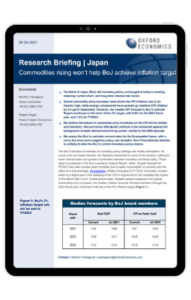Commodities rising won’t help BoJ achieve inflation target

The Bank of Japan (BoJ) left monetary policy unchanged at today’s (28th October) meeting, retaining current short- and long-term interest rate levels. There were no surprises in the BoJ’s quarterly Outlook Report, either. Growth forecast for FY2021 has been revised down modestly due to weak consumption in summer and the effect of a chip shortage. As expected, inflation forecasts for FY2021 have been revised down by 0.6ppts due to the rebasing of the CPI in August which has amplified the impact of the March 2021 cut in mobile-phone rates.
What you will learn:
- Global commodity price increases have driven the PPI inflation rate to a historic high, while energy components have pushed up headline CPI inflation by 0.5 ppt in September. However, the median CPI forecast in BoJ’s Outlook Report continues to fall short of the 2% target, with 0.9% for the 2022 fiscal year, and 1.0% for FY2023.
- We believe the impact of commodity price increases on the CPI will be limited and transitory. Second-round effects will continue to be restrained against the background of weak demand and pricing power, similar to the 2008 episode.
- We expect the BoJ to maintain current rates for the foreseeable future, with a cut to the short-term (negative) policy rate doubtful. New Prime Minister Kishida is unlikely to alter the BoJ’s current monetary-policy stance.
Tags:
Related Services

Post
US Key Themes 2026: Exceptionalism amid fragmentation
US exceptionalism is alive and well, and that won't change in 2026.
Find Out More
Post
Global Key themes 2026: Bullish on US despite AI bubble fears
We anticipate another year of broadly steady and unexceptional global GDP growth, but with some more interesting stories running below the surface.
Find Out More